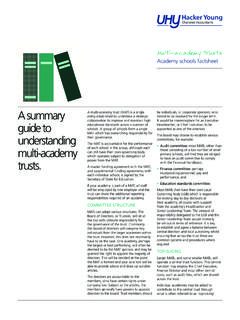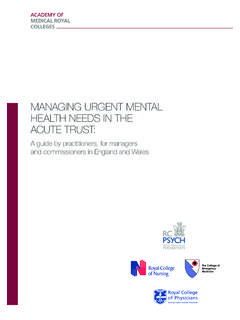Transcription of Free school application guidance - New Schools …
1 free school application guidance Special Schools opening in 2017 and beyond January 2016 Growing Schools advice support ideas 2 Charity number: 1132122 Contents If you would like to refer to a particular section in the handbook you can Ctrl + Click on the title in this content page to be taken to it. Introduction .. 3 i. What are special free Schools ? .. 3 ii. How do I set up a special free school ?.. 6 iii. How New Schools Network (NSN) can help .. 7 Before you start: .. 8 How to use this guidance .. 9 A. Applicant details .. 10 B. Outline of the school .. 13 C. Education vision .. 15 D. Education plan .. 21 D1. The curriculum plan .. 22 D2: Measuring pupil performance effectively and setting challenging 31 D3: Staffing structure .. 39 D4: Inclusivity .. 44 Section D5: Assessing and meeting the needs of all pupils.
2 48 E: Evidence of need .. 52 E1: Evidence of need: Pupils with a Statement or EHC Plans or Education Health and Care Plans (EHCP) .. 53 E2. Evidence of need: children without a Statement or EHC 58 Section F: Capacity and capability .. 61 F1: Capacity and capability (pre-opening expertise) .. 62 F2. Governance structure (post-opening).. 71 F3: Independent Schools , including special institutions that are privately run: a good educational track record and credible plans for meeting the standards of the state sector .. 79 F4: Independent Schools , including special institutions that are privately run, have a good financial track record and credible plans for meeting the standards of the state sector 81 F5: Independent Schools have an appropriate, well-maintained secure G: Budget planning and affordability .. 84 H. Premises .. 87 Appendix .. 89 application reading list special free Schools .
3 93 free school application checklist: what to do before submitting your application .. 95 Acronyms explained .. 97 3 Charity number: 1132122 Introduction This detailed handbook should be used in conjunction with the Department for Education s free school application guide and their application materials for special free Schools . The DfE s criteria for assessment outline the criteria that will be used to assess the sections of the application form. This handbook aims to help you fulfil these criteria to the best of your ability. NSN s role NSN supports groups with their application but we are not part of the Department for Education and we do not have any role in the assessment of free school applications . Working with us will not affect the way in which the DfE will assess your free school application . i. What are special free Schools ? free Schools are new, state-funded Schools that are independent of Local Authority control and set up in areas with demonstrable need.
4 Special free Schools are free Schools that provide specialist, full-time education for pupils with a specific SEN, either with or without a statement or EHC Plan or EHC Plan. Once open, free Schools have the same legal status as academies and are funded and held accountable in the same ways. In England, special free Schools must: Teach students only of statutory school age, meaning from Reception (normally starting age 4) until age 19. Any provision in a free school at nursery level or for over-19s will not be funded by the DfE as a free school ; Abide by the school Admissions Code for pupils without a statement or EHC Plan; Have more than 5 full time pupils over the age of 5 without a statement or EHC Plan, or 1 pupil with a statement or EHC Plan; Take account of the SEN Code of Practice; Be run by a Charitable Trust; and Provide a broad and balanced curriculum including core subjects such as Maths, English and Science for children without a statement or EHC Plan, and a curriculum focusing on English, Maths and progression beyond education for those with a statement or EHC Plan.
5 free Schools do not have to follow the National Curriculum. How are special Schools funded? The school will receive 10,000 from the Education Funding Agency (part of central government) for every pupil with a statement or EHC Plan, plus an agreed additional amount from the child s Local Authority to cover the remaining cost of the provision. For children who have an SEN but do not have a statement or EHC Plan, special free Schools are funded on a per pupil basis at an equivalent level to mainstream Schools in the LA in which the school is based (around 4,000 per pupil). Independent special Schools becoming free Schools The DfE welcomes strong independent Schools , including independent special Schools , to apply to join the state sector. If you are interested in doing so you will need to meet all of the independent school criteria as outlined in the DfE s free school application guide.
6 It will be important that, through the application , you demonstrate: How your school will enhance choice and increase the number and quality of places locally. The progress you will have already have made to develop and adapt your education, governance, leadership and management systems so that they are ready for the rigours of the state sector and the Ofsted inspection under the common inspection framework (CIF). It is expected that your application will demonstrate a greater level or preparedness in these areas given that your independent school has already established capacity and capability. 4 Charity number: 1132122 Clear strategic plans for how your education and leadership arrangements will transition to the state sector ready for opening successfully. How you will widen access to your provision, particularly with regards to admitting and attracting pupils eligible for the pupil and service premiums that are proportionate to such children resident in the local authority, including by prioritising children eligible for these premiums in your admissions arrangements.
7 You will also need to cease selecting intake according to academic ability and comply with the school Admissions Code and free Schools policy. For example if you are a faith school you may only admit a maximum of 50% of pupils by reference to faith and you may no longer admit pupils from non-European economic areas. How your school can and will meet the needs of a new and different pupil population. You should demonstrate how your behaviour and safety policies reflect the impact that different groups within the school , including pupils with special educational needs and disabilities, looked after children and pupils with English as an additional language. How effectively you have already prepared your school to succeed in the state sector and achieve at least `Good or `Outstanding in your first Ofsted Inspection. In particular, demonstrate how you will monitor and track pupil progress and meet both Ofsted s pre- and post-16 achievement criteria (as appropriate to your school ).
8 How leadership in your school has successful systems in place to monitor and develop the effectiveness of teaching and learning delivered by staff, and the CPD arrangements to underpin that. Clear transition plans for your governance arrangements. You are required to complete a self-assessment of current governance arrangements and clearly detail your plans to become a highly effective governing body within the state sector. Additionally, as part of your free school application you will need to: Sign a declaration guaranteeing that you have disclosed all financial liabilities, including tax disputes. Complete a self-assessment against the Ofsted common inspection framework (CIF). It is recommended that you have these plans externally validated, ideally by a trained Ofsted inspector. Have no significant issues relating to compliance in your last report.
9 Provide a link to your most recent inspection report. Demonstrate that you have a good track record in managing finances. Submit two years audited accounts (or alternative evidence of financial viability if your school has been open less than two years). The DfE will judge your proposal on the basis of whether it is value for money, and if it will be successful in the state sector. You are unlikely to be approved unless you can demonstrate this in your application . The DfE will consider the costs and benefits of the proposal based on a number of factors including: A good or outstanding (or equivalent) rating in your last inspection. Your plans to increase capacity and take on more pupils (this can be either through filling existing vacancies or creating new places). The level of debt of your existing school . The size of capital investment required.
10 The outcomes you currently obtain for pupils When considering your plans to apply to convert to a free school , it is important to bear in mind that the DfE have stated they favour applications from independent Schools which can expand their pupil intake and that if your school has significant debts or requires large capital investment, it is unlikely to be approved. 5 Charity number: 1132122 If your school passes the paper based assessment, you will receive a visit from one or more DfE representatives prior to your interview. This will also inform the questions you are asked at your interview with the DfE. Additionally, as an independent converter you will not usually be entitled to the post-opening funding that other free school groups can access. Issues to be aware of Currently the free Schools policy only applies in England, and it is therefore not possible to apply to set up a free school outside of England.






